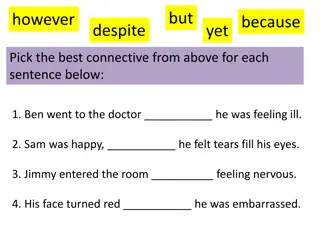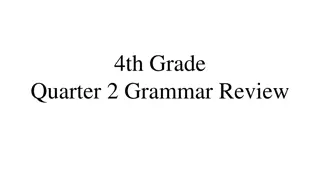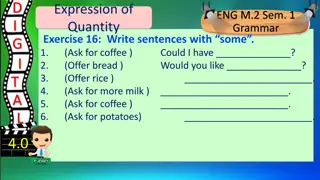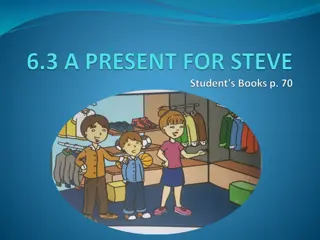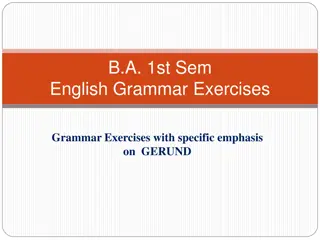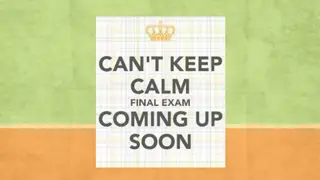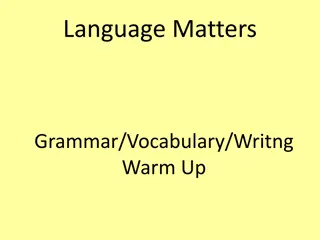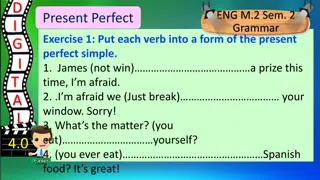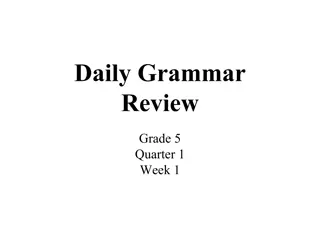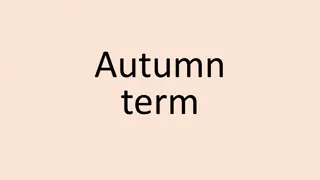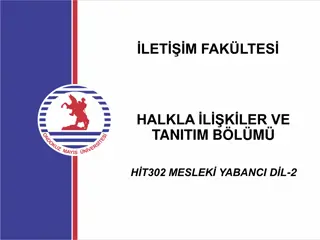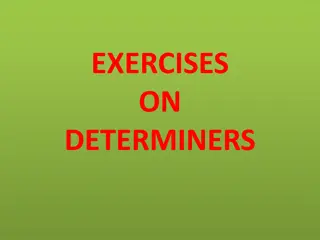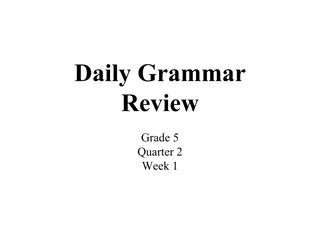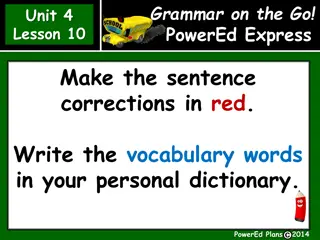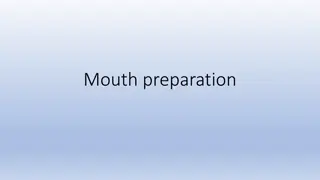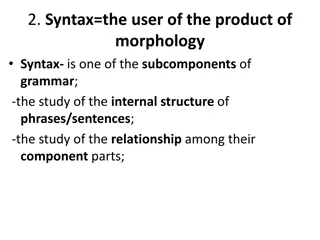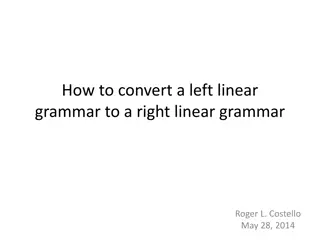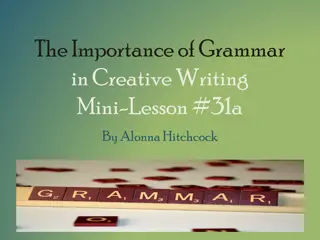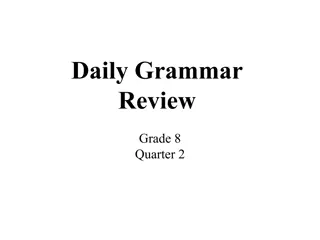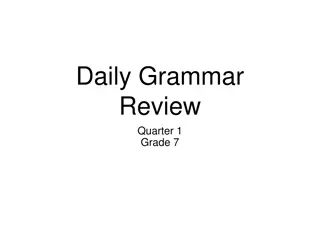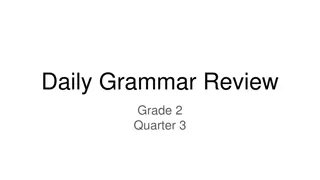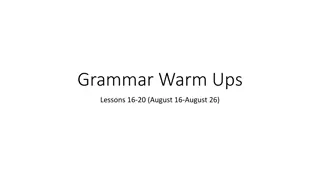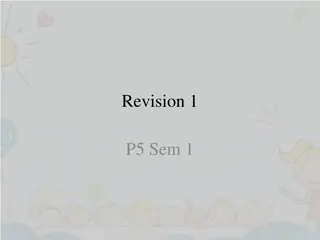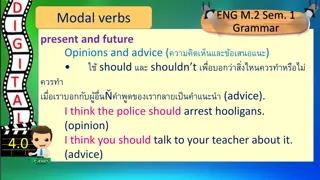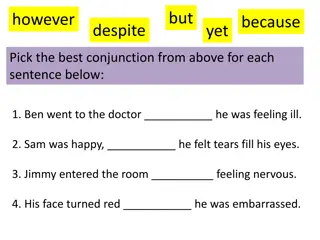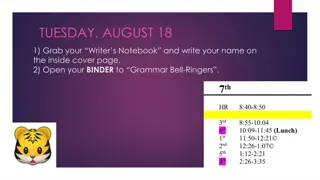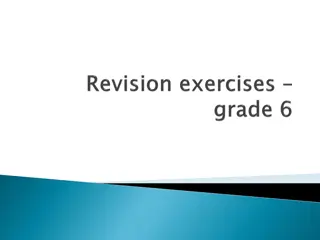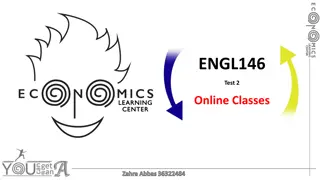Grammar Practice Exercises for ACT Preparation
Practice your comma usage, sentence restructuring, identifying subjects and predicates, and understanding prepositions with the provided exercises. Improve your grammar skills and prepare for the ACT with these interactive activities.
Download Presentation

Please find below an Image/Link to download the presentation.
The content on the website is provided AS IS for your information and personal use only. It may not be sold, licensed, or shared on other websites without obtaining consent from the author. Download presentation by click this link. If you encounter any issues during the download, it is possible that the publisher has removed the file from their server.
E N D
Presentation Transcript
Practice #1 Directions: Take out a half sheet of paper. Rewrite the following sentences. If the comma is unnecessary or incorrectly placed fix them or delete them from the sentence. Some sentences have more than one comma error. If the sentence is correct as written, write Correct. 1. Next time I go to the store, I m going to get peanut butter, jelly, and, bread. 2. It seemed like the characters treatment of their dog in the movie was exceedingly, inhumane, and hurtful. 3. On sunny summer days, history, museums don t seem so appealing. 4. Jazz, whether you like that style of music or not, was one of the most important cultural movements of the twentieth century. 5. Sometimes, when Americans, who love Chinese food, go to China, they find, ironically, that they don t like the food.
Information for practice #2 Every sentence has two parts: the subject and the predicate. The subject describes whom or what the sentence is about. The simple subject is a noun or pronoun that states exactly whom or what the sentence is about. The predicate is a verb that tells what the subject does, what is done to the subject, or what the condition of the subject is. The simple predicate is a verb or verb phrase that tells what the subject of the sentence does or is.
Practice #2 Rewrite the following sentences. Underline the subject once and the predicate (verb) twice in each sentence. 1. Penny played golf yesterday. 2. Matt likes the Red Sox. 3. Who is having the cheeseburger and fries? 4. They are at the movies right now. 5. Vanessa writes 7 pages a day. 6. Where do I find Lambeau Field? 7. Viet Than Nguyen won the Pulitzer Prize in 2016. 8. Students learn best by doing their homework. 9. Erika called me the other day. 10.Shelley has been going to medical school for ten years.
Information for practice #3 A preposition is a word that relates a noun or a pronoun that appears with it to another word in the sentence. Prepositions usually describe the position of something, the time when something happens and the way in which something is done, although the prepositions "of", "to" and "for" have some separate functions. Common prepositions are on, at, of , to, under, with. A preposition starts a prepositional phrase. A prepositional phrase is a group of words that includes a preposition and noun or pronoun called the ibject of the preposition. In each of the following examples, the preposition is underline, and the object of the preposition is in boldface. Examples: on the bridge near the bridge over the bridge
Practice #3 Rewrite the following sentences. Underline the subject once and the predicate (verb) twice in each sentence. Cross out the preposition and circle any object of the preposition. 1. Damien threw the ball over the fence. 2. Katie went to the movies with her husband. 3. My grandfather likes to fix things around the house. 4. Kim walked her dog at night in the park. 5. I was really surprised how big the music library is on Spotify. 6. The stories on The Daily Show are funniest around election time. 7. Dashiell Hammett was one of the first detective writers. 8. During summer break, the members of our anime club visited San Diego Comic- Con. 9. Everyone except Keahi got on the boat to the island by noon. 10. After the sale, every shopper went into the store, down the elevator, and to the bargains in the basement.
Information for practice #4 A clause is a group of words containing a subject and a verb. A subordinate clause is one that contains a subject and a verb but does not express a complete thought. An adjective clause is a subordinate clause that is used as an adjective. In a sentence, it modifies a noun or pronoun by telling what kind or which one. Adjective clauses begin with relative pronouns (who, whom, whose, which, or that) or relative adverbs (when, where, why, before, and after). Adjective Clauses I bought the book that was on sale. The man whom you described is my uncle. We need a place where we can relax.
Practice #4 Copy each sentence down. Underline the adjective clause in each sentence. Then, circle the noun or pronoun it modifies. 1. The book that you mentioned is no longer in print. 2. It is they who should be ashamed. 3. The capital, which we visited, is not a very big city. 4. This is the style that she prefers. 5. The man to whom you spoke is the general manager. 6. Is this the map that he wanted? 7. The woman who wanted to talk to you is on her lunch break. 8. The man whose car is outside will be disappointed. 9. The jacket, which was on sale, was the first item I purchased. 10.The woman whom you speak of is my Aunt Jane.
Information for practice #5 An infinitive is a verb form preceded by the word to that acts as a noun, an adjective, or an adverb. An infinitive phrase is an infinitive with its modifiers or complements. Like infinitives, infinitive phrases can function as nouns, adjectives, or adverbs. Infinitive: To disagree would have been foolhardy. Infinitive Phrase: To find a good mechanic is no easy task.
Practice #5 Rewrite the following sentences. Underline the infinitives or infinitive phrases in each sentence. Frank wants to wait here for Mary. Bonnie really wanted to win. Above all, we wanted to be sure of his loyalty. To accept stolen goods is a criminal offense. Nick wanted to get seats near the stage. Rewrite the following sentences. Underline the infinitive in each sentence. Then, write the part of speech it is used as on each line to the right. Lawrence is the opponent to beat. Where is a good place to eat? The computer program is easy to learn. Joe would be happy to help you. The music began to play. 1. 2. 3. 4. 5. 6. 7. 8. 9. 10. _____________________________________ _____________________________________ _____________________________________ _____________________________________ _____________________________________



